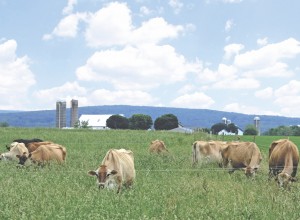
EPA Could Snatch Up 600,000 Acres of Cropland
Article and Photo from Farmshine Periodical
CAMP HILL, Pa. — Pennsylvania Farm Bureau (PFB) is disappointed with the federal Third Circuit Court decision that upholds the Environmental Protection Agency’s (EPA) implementation of a Total Maximum Daily Load (TMDL) in the Chesapeake Bay Watershed.
“We disagree with the court’s decision that seems to give EPA employees the authority to trump local land use decisions in the watershed,” said PFB President Rick Ebert.
Farm Bureau notes that the court decision will not only affect farmers, but also have an adverse impact on local communities and rural economies. EPA itself projects that roughly 20 percent of cropped land in the Chesapeake Bay Watershed (about 600,000 acres) will have to be removed from food production and be converted to grassland or forest in order to achieve water quality goals.
“Placing one-fifth of the watershed’s fertile farm land into retirement will have a significant impact on local communities and local food systems,” Ebert said. “What makes this even more troubling is that more recent study and analysis suggests EPA’s one-size-fits-all approach is largely inefficient in attaining reduction goals, and recommends a more localized effort to best use Pennsylvania taxpayer dollars in reducing nutrient and sediment loss.”
PFB also points to the shortcomings of EPA’s Chesapeake Bay Watershed Model to accurately reflect what farmers are doing voluntarily to improve water quality.
“The numerous projects and best management practices installed by farmers without the use of federal monies are not always counted towards progress in EPA’s Bay model,” explained Ebert. “Furthermore, cover crops – a growing practice with tangible environmental benefits – are not counted toward meeting water quality goals if the crop is harvested. EPA’s model would rather have the cover crop sprayed dead than see it used as valuable animal feed.”
PFB has actively worked with state and federal officials to find a feasible way for Pennsylvania to meet water quality goals. And Farm Bureau continues to work with officials to find a way for farmers to receive full credit for conservation practices that are effectively preventing runoff but not recognized by EPA as an improvement.
Farm Bureau is carefully analyzing the court’s opinion.
Pennsylvania Farm Bureau is the state’s largest farm organization with a volunteer membership of more than 61,000 families.

Copyright © 1997-2017, Pennsylvania Landowners' Association. All rights reserved.